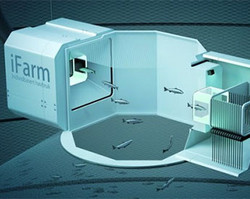
Cutting-edge farming technology favours individualised fish monitoring
editor/Mohamed Shihab
Cermaq has been granted permission to develop innovative technology that will transform fish farming from stock management to individualized farming, effectively reducing the need for sea lice treatment.
The firm was given the green light after the Directorate of Fisheries has found that the firm’s iFarm concept to be within the scope of the Norwegian development licenses system.
Cermaq has applied for ten licenses to implement the technology that will reduce the environmental footprint of farming and bring fish welfare and fish health to a new level as each fish is being individually monitored.
"iFarm will enable us to bring fish welfare to a new level by monitoring each fish in the pen," pointed out Knut Ellekjær, Managing Director of Cermaq Norway.
iFarm is based on photo recognition of the fish, which allows to monitor factors as growth, sea lice, disease, lesions and others aspects that affect the health and welfare of the individual fish.
In addition, it is possible to separate the fish that needs treatment, for example against sea lice. Thus, the extent of sea lice treatments will be dramatically reduced.
“The biological challenges are crucial for the success of farming in a sustainable way. iFarm is based on biological competence and has many parallels to what we have in agriculture and the food sector. Digitization and machine learning make it possible to monitor each fish individually without stressing the fish. This makes it an important tool for safeguarding our fish and a giant leap for fish farming," stressed Harald Takle, technology research director and project manager for iFarm.
The development of iFarm includes series of testing and model testing as well as full scale operation to achieve sufficient volume for machine learning with the required precision level.
"We are excited and very eager to get started soon. In the future there will be stricter requirements to farming. iFarm will be an effective tool that will reduce the environmental impact while ensuring fish welfare for each fish. The technology can be used in open net pens as well as in closed systems," concluded Geir Stang Hauge CEO of BioSort.


ساحة النقاش